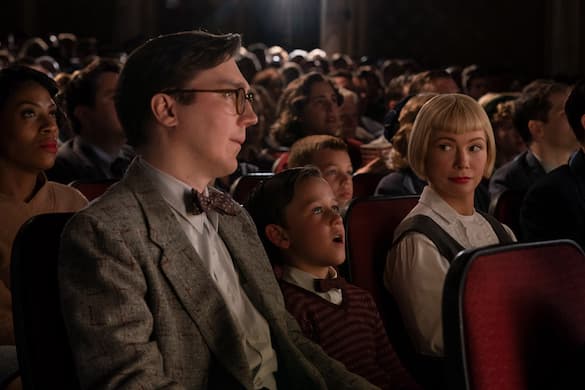How To Describe Steven Spielberg’s Latest, Other Than Spielbergian?
‘The Fabelmans’ has its moments — David Lynch and Judd Hirsch are excellent in their accumulated 10 minutes of screen time — but in the end capitulates to the director’s soft-focus sentimentality.

“What this film needed,” one attendee stated volubly upon exiting the premiere of “The Fabelmans,” “was more old geezers.” If my reading of the crowd during the run of director Steven Spielberg’s most recent and, in fact, most personal film was at all accurate, that critic reflected the overall consensus.
Toward the end of “The Fabelmans” we meet John Ford — yes, the director of cinematic milestones such as “Stagecoach,” “The Searchers,” and “The Man Who Shot Liberty Valance.” As portrayed by David Lynch — yes, the director of cinematic oddities such as “Eraserhead,” “Blue Velvet,” and “Mulholland Drive” — Ford is a cigar-chomping coot who gives our hero, Sammy Fabelman (Gabriel LaBelle), a lesson in compositional dynamics.
Ford’s gruff pedagogy is too terse, funny, and true to spoil here. Suffice it to say, Mr. Lynch has a grand old time with the role and almost walks away with the picture. His primary competition in that regard is the redoubtable Judd Hirsch, here playing long lost Uncle Boris.
Mr. Hirsch is in fine alte kaker mode here, eating chicken with his hands, dispensing sundry yiddishisms, and offering colorful lessons on life and art to young Sammy. Mr. Hirsch plays the role with considerable gusto, navigating adroitly between extravagant shtick and something more grounded. When Uncle Boris gets into a cab to return to his peripatetic ways, we can’t help but rue his departure.
The accumulated screen time for Messrs. Lynch and Hirsch probably amounts to 10 minutes which is a drop in the bucket for a film that comes in just short of two-and-a-half hours. The rest of “The Fabelmans” has its moments — with Mr. Spielberg at the helm and playwright Tony Kushner contributing to the screenplay, it had better — but, in the end, this coming-of-age story, memoir, and love letter to the movies capitulates to the soft-focus sentimentality that is Mr. Spielberg’s Achilles heel.
“The Fabelmans” was prompted 17 years ago on the set of “Munich.” While waiting for the effects crew to jigger an explosion, Mr. Kushner asked Mr. Spielberg how and when he decided to become a film director. Whereupon Mr. Kushner was regaled with the story of how 6-year old Steven Spielberg was forever transformed after attending “The Greatest Show on Earth,” an unwieldy cinematic opus typical of its maker, Cecil B. DeMille. This is, for all intents and purposes, the first scene in “The Fabelmans” and, in fact, a teenage Mr. Spielberg did ultimately meet with John Ford.
It’s always prudent to distinguish between the randomness of life and the prerequisites of art, but “The Fabelmans” hews closely to Mr. Spielberg’s early years and family life. Paul Dano portrays Burt Fabelman, a moon-faced computer engineer whose smarts and foresight have his family constantly on the move due to job opportunities that can’t be turned down. Burt’s wife Mitzi (Michelle Williams) has put a career in music on hold to dote on her four children.
The trouble is that Mitzi spends as much time doting on “Uncle” Benny (Seth Rogan), Burt’s best friend and a less-than-brilliant computer engineer with whom she is deeply in love. Among the rare pointed moments in “The Fabelmans” is when budding movie director Sammy inadvertently films Mitzi and Benny being overly familiar while on a family camping trip. Tensions arise, as does the opportunity for Mr. Spielberg to pay homage to Michelangelo Antonioni’s “Blow Up.”
“The Fabelmans” is a peculiarly lumpish entertainment, having been culled from first-hand experience and then filtered through cliches attendant to the popular culture in which its creator came of age. Squint your eyes and this valentine to sweet, sweet youth could almost seem like a sly John Waters parody.
When considering “The Fabelmans” in relation to Mr. Spielberg’s recent, effulgent take on “West Side Story,” you can’t help but conclude that some artists are more fully en pointe working from outside source materials than upon personal history. As it is, “The Fabelmans” is a filmmaker’s indulgence draped in mass entertainment convention and, as such, best enjoyed by fans and completists.

